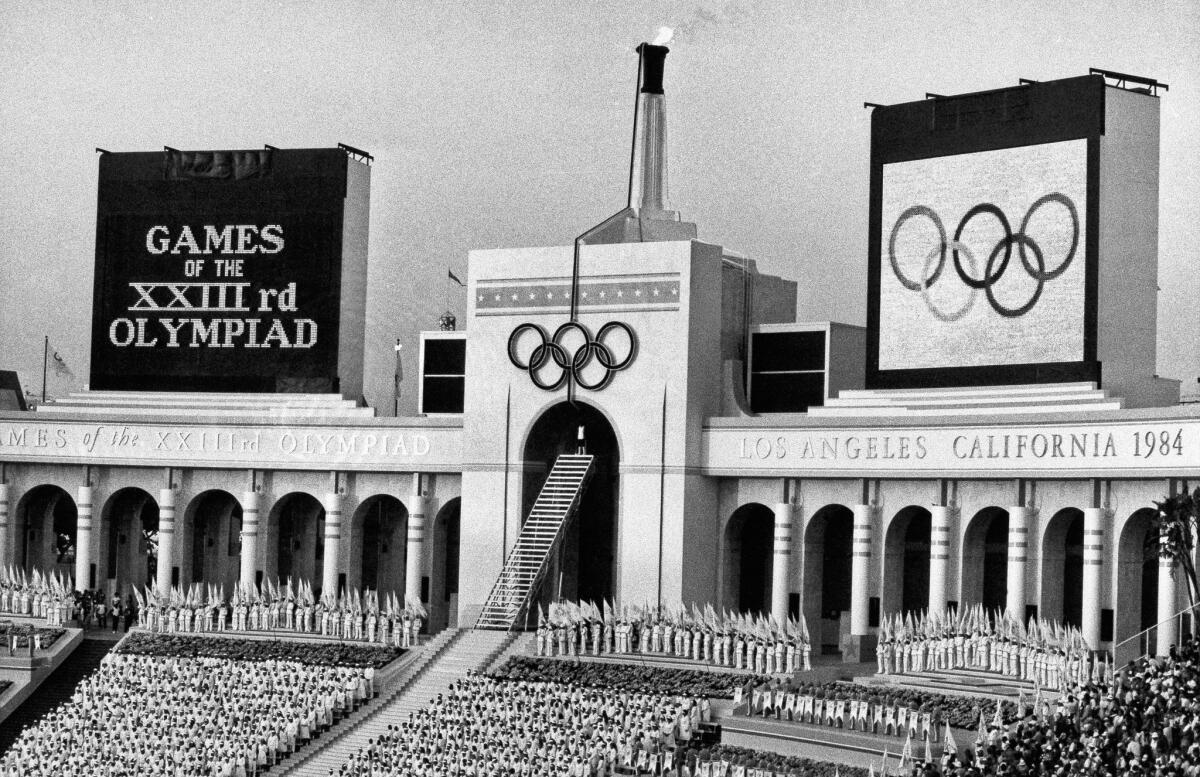Opinion: Some credit for the little-known figure behind L.A.’s 1984 Olympic Games deal

In this July 28, 1984, photo, the Olympic flame is flanked by a scoreboard signifying the formal opening of the XXIII Olympiad after it was lighted by Rafer Johnson during the opening ceremonies in the Los Angeles Memorial Coliseum.
- Share via
With all the renewed excitement about a possible return of the Summer Olympics to Los Angeles, we may be hearing the name Bob Ronka again.
Don’t know who he is? You’re not alone. I hadn’t heard his name until yesterday, when the circumstances of L.A.’s Olympic negotiations in the 1970s suddenly became particularly relevant. Boston dropped out as the U.S. bidder for the 2024 games this week, saying it couldn’t take on the financial risk. Now, L.A.’s rejected bid is back on the table, as are questions about how the deal will unfold.
No surprise. Los Angeles seriously rocked as host of the summer Olympic Games in 1984, which raked in money and have become the gleaming example of a modern-day games. Then-Mayor Tom Bradley gets the credit for putting together a kick-ass deal for the city, which included a waiver from the usual requirement that the host city absorb any cost overruns. It was particularly prudent, considering the 1976 games had left Montreal with about $1.5 billion in debt. (It was finally paid it off in 2006, in large part from tobacco tax proceeds.)
And Bradley should get credit, just not all of it.
In fact, it was Ronka, a one-term city councilman from the San Fernando Valley, who forced Bradley’s hand on the waiver. Ronka was deeply suspicious of the Olympic deal. He led a contingent of other council critics who managed to force a citywide vote on a “costs control” charter amendment in 1978. It passed with enormous support and left Bradley with little choice but to insist the IOC accept that Los Angeles wouldn’t take on liability for any cost overruns. He got the deal -- probably because L.A. was the only serious city bidding for the games.
The Times stories from the era paint Ronka as a bit of a publicity hound. In one from 1978, Ronka rushed home from Athens after being shut out of the city’s Olympics negotiations, flying in one day before Mayor Bradley returned. Ronka held a press conference as soon as he landed, in which he denounced the IOC “aristocrats” and their influence over the rubes from L.A.
His antics, however, may have doomed a 1981 run for city attorney against Ira Reiner. One of Ronka’s political mailers so outraged the Los Angeles Times editorial board that it yanked its endorsement of him, saying “From beginning to end, the contest between [Ira] Reiner and Ronka has been an ugly one, and we wash our hands of it.”
Ronka lost that race, and little has been heard publicly of him since. Until now, perhaps?
Follow me on Twitter @marielgarzaLAT
More to Read
A cure for the common opinion
Get thought-provoking perspectives with our weekly newsletter.
You may occasionally receive promotional content from the Los Angeles Times.










